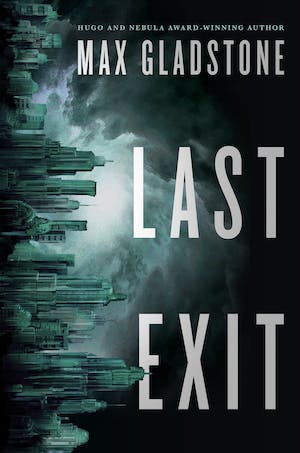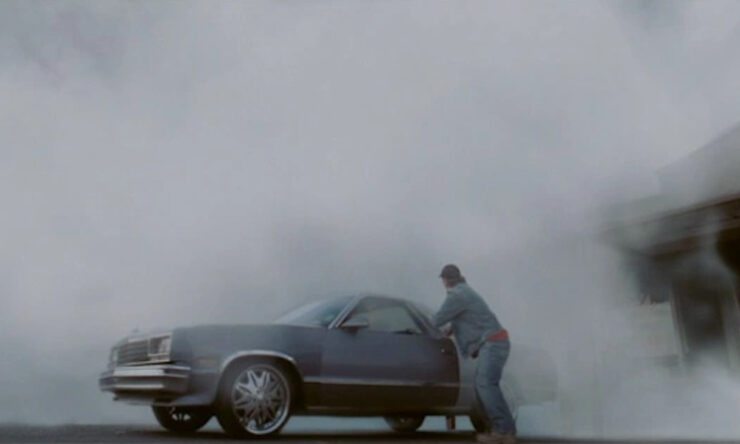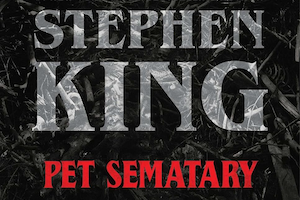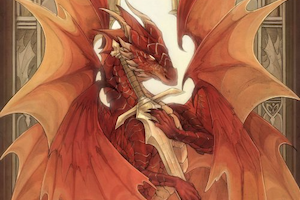Welcome back to Reading the Weird, in which we get girl cooties all over weird fiction, cosmic horror, and Lovecraftiana—from its historical roots through its most recent branches.
This week, we continue Max Gladstone’s Last Exit with Chapters 17-18. The novel was first published in 2022. Spoilers ahead!
Summary
“I’ve been here all along,” the cowboy said. “Y’all made me.”
The first time the alt-riders tried to reach the crossroads, they left Yale at sunset, planning to arrive at midnight. All they had to do, Sal said, was focus on the alt road and make their destination real in their minds: the place where they could fix things. In the morning they would come home, changed.
It almost worked out that way. “Worlds flickered around them like an optician’s lenses… The landscape cracked and fire flowed.” Centipede-bird things flew overhead, and Sal said they were almost there, and then Ish saw the crossroads infinitely far off in the sky, “twisted as a Mobius strip.” He thought the crossroads belonged to him, to all five of them. Then—sky and road cracked and spawned writhing shadows, and the shadows (or was it the crossroads?) asked, What do you want?
Ish just wanted it to stop.
Somehow they hitched back to the summit of East Rock Park, the Challenger smoking and running on shredded tires. Ramon bent his head to the steering wheel, weeping. Ish and Sarah clutched each other. Zelda, sick, staggered out of the car, Sal making way “with the precision of a satellite… each movement perfectly controlled because any slip, any mistake, would be disaster.” Eventually Ish managed, “It was waiting for us.”
Sal pointed to the sky. Behind it something moved and struck once, thunderously. It was “roiling and more massive than clouds, made of shades and swollen nothings.” In it, Ish saw the tiniest crack.
A shaken Zelda said, “It’s real.” To Sarah’s “So what the fuck do we do now?” Sal said: “We try again.”
* * *
Back to present story-time: In an alt as dry as a scooped-out eggshell, Ish falls asleep guarding Sarah and June’s tent. Waking, he bemoans his rusty road skills and worries about what to do with June, who still thinks “there were battles here to win.”
The sky gives a “bone-deep creak”—hairline fractures halo the stars. At the sky’s heart is “the absence that was Sal.”
Come daylight, the cracks remain, wriggling when viewed sidelong. The alt-riders walk toward distant hills, Ish longing for cover. He avoids looking at Sarah, because that makes him feel “something tight and sour underneath his heart.” She’s grown over the years, and she’s had the courage to marry. Whereas marriage for Ish seems a foreign concept—he fills his needs with as little risk as possible. Maybe Sarah’s right that June’s knack could be channeling rot. No power’s neutral, though: “Everything you used bound you.”
Ish’s own knack tells him that beyond the hills, people are dead and one man dying. When the others smell smoke, he’s forced to tell them. Sarah and June rush ahead anyway. They need water, supplies, transport. Nor can physician Sarah resist her need to heal. Ish follows through hillside pine scrub. Then he glimpses, and loses sight of, a white hat.
In the valley Sarah and June find a circle of high-tech prairie schooners, burned, and inside the circle dead men, women and children, also burned. Sarah recognizes their wagons and synthetic clothing from a post-apocalyptic world in which survivors view their former advanced technology as mythological, but can still use some of it due to deep-buried data centers and crude neural implants. She wonders how this group was displaced to their current alt. Apparently the road’s rules are changing on the road.
At camp center they find a man staked to the ground. From the metal plugs and wires in his skull, Sarah recognizes that he’s a data center-connected “teacher.” They also find four skeletal “horse-bots.” Sarah activates one and tells June they’ll be able to ride it. Ish arrives as she’s freeing the staked man, hoping to get him back to his own alt where he can reconnect with his data “voices.” The poor guy is like a lost phone, his moans dial tones, waiting for someone to pick up…
A phone… which was what the cowboy used in their own world to peer through the alts…
The dying man seizes Sarah’s throat, now wearing a white hat. Ish and June wrestle Sarah free. The other corpses rise, also white-hatted. Take the hat, the cowboy says, and earn salvation from a world coming apart. June feels the instability herself: beneath the cracking shell are shadow-creatures hungry for release.
Sarah and June mount one activated horse-bot. Ish mounts another. They escape the camp, but the cowboy-minions follow on black horses that look alive but cast no shadows. June reaches through the shell of the world to summon the shadow-creatures. They burst through the ground like barbed spider legs, destroying the cowboy-minions, and June feels with them their “free alien joy.”
Out of the dust billowing skyward, Sal’s shape emerges and reaches for June. June reaches back, falling upward, but Sarah holds her fast. The horse-bots charge onward. Then, “with a leap and a hitch,” the alt-riders are gone.
This Week’s Metrics
What’s Cyclopean: If East Rock in New Haven were to speak, it would do so “in tongues of continental divorce.” I’m just going to spend a while mooning over that sentence.
The Degenerate Dutch: The cowboy says it’s not supposed to be this easy for the strange, dark things to get in. “I can save you. Just put on the hat.” This is totally not a metaphor.
Libronomicon: Sarah has not, so far, written Annals of Shit I Wish I Hadn’t Seen, Volumes 1-5.
Ruthanna’s Commentary
I’m beginning to think that Zelda and company don’t know as much about the nature of reality as they thought they did in college.
To be fair, if that wasn’t true, they would be even more inhuman figures of legend than they occasionally seem to each other. But because they kind of are figures of legend, the scale of their confusion may be itself legendary.
Backing up, my own resolved confusion this week was my assumption that they only went to the Crossroads once—the time that they lost Sal. “We try again” puts that in a whole different light (or a whole different shadow). They arrive the first time, they see the Crossroads “beautiful and strange, twisted as a Mobius strip” in the sky. “And then it went wrong.” But after the shadow-talons appear, the next thing we see is the gang skidding back into New Haven, nauseated and bloody and terrified.
What happened in between, we haven’t yet learned. Did the shadows try to keep them from the crossroads, fight them off with bloody teeth and claws? Or, faced with apparent horror beyond human imagination, did they shy away—and did the shadows try to keep them there? From Ish’s report, it seems like the latter: the shadows, which may also be the Crossroads, ask what he wants, and he begs them to “stop it” and let the gang go safely home.
Stories about crossroads deals are not, as a general rule, stories about haggling with a friendly clerk at the bodega. The crossroads is where you bargain with devils, where you trade your soul for your heart’s desire. In the happiest stories, it’s where you trick the forces of darkness and get the better end of the bargain. I don’t think our pulp adventurers thought through what they were looking for. I think they expected something as stereotypical as dinosaurs or cannibal biker gangs, red-skinned and horned and beatable at chess.
I’m beginning to think that instead of what they expected, they found exactly what they were looking for. And I think they told a story, afterwards, to convince themselves that they didn’t—that the shadow-rot stood between them and change, rather than being the change. Because here’s the thing: they didn’t know about the rot before that point. When they were just traveling apocalyptic alts, as far as I can tell, they blamed the destruction purely on bad decisions by humans. It’s only after the crossroads, when the shadows started to crack the sky of their own world, that they started thinking of it as the universal destroyer.
These were Yale students, taught to see change as something you make by being smart enough, rich enough, controlled enough, determined enough: all the coping strategies the gang tries in the post-Crossroads years. June, on the other hand, has been a street protestor fighting outside the system. She knows that change is messy and bloody and dangerous and sometimes incomprehensible—and she (perhaps like Sal) is the one who now sees potential in what the others think of as deadly corruption. “Monster possibilities curled around one another, like protesters kettled in until panic starts a mob”. Their “free alien joy” is perhaps not far off from what Cthulhu offers, the unchained potential that terrifies whoever’s currently on top.
The gang’s been thinking of the Cowboy as fundamentally similar to the rot, but he clearly isn’t. His bodies cast no shadow, repel anything strange or different. He has a clear age, a clear nature: an American dream 500 years old and all too human. And even people who seek change are shaped by the society that birthed them, frightened of losing the things it taught them to take for granted.
Maybe the alts died because they wouldn’t let change in. Maybe merely-human bad decisions must ultimately crystalize into a static, deadly story—like the Cowboy. In that case, the shadows that Zelda’s been fighting for a decade are doing exactly what she asked for in the first place. Or what Sal asked for, the only one who actually dared.
Now, is the change that the Crossroads bring good, from a human survival and sanity perspective, or is it even worse than alt-style crystalized-story catastrophe? That’s a whole ‘nother question.
Anne’s Commentary
I think that one “knack” the alt-riders unknowingly share must be immortality—how else can they have survived the shattered landscapes and violent encounters most every “hitch” drops them into? That, or one of the mysterious Powers That Be alt-side must be looking out for them. Make that one or more Powers—I count two major contenders for the title. There’s Team Black, represented by the Shadows and Rot. There’s Team White, represented by the Cowboy and his fellow White Hats. It’s the classic battle, Darkness Vs. Light, which universally boils down to Good Vs. Evil, doesn’t it?
Last Exit has been pleasurably provoking me with this question: Which of its dualities is which? The color black usually denotes evil, the color white good. Places that are shadowy inspire apprehension, because villains, predators and monsters may lurk there. Things that are rotten inspire disgust and the fear of contamination; if you rot, you must be dead, or worse, the living dead. Conversely, at least according to American folklore and pop culture, cowboys are good, the common man heroes at the heart of innumerable Westerns, along with their official counterpart the sheriff. A broader view of history—one including Native Americans and environmental repercussions—must take a far less idyllic view of East-West settlement. This broader view smudges up the White Hat for Gladstone’s central characters and many readers, making the Cowboy = Good Guy trope a complicated business.
A couple chapters back, Zelda and Ramon had to contend with a strongly Mad-Maxian alt. Chapter 18 sees Sarah, June and Ish stuck in a relatively safe counter-reality of unpeopled plains and modest hills. Does this mean Ish can contrast Sarah’s domestic bliss with his own solitary “efficiency” without getting interrupted? Can Sarah peacefully dwell on what Halloween costumes her kids will soon be wearing and that book her husband teases her to write? Forget about it. Yes, this alt is in itself bland, but our alt-riders aren’t the only ones who’ve dropped in. Beyond those hills are a whole wagon train of folks somehow whisked away from their native alt to give the place a strongly Western flavor.
And the wagon train has been circled, alas, to no avail.
Just by coincidence (or is it?), the original alt-riders once visited the displaced survivors’ world under less hectic circumstances than usual. They had time to sit a spell and study the locals, and so Sarah can explain to newbie June how their culture came to emulate not any old Western but a Western-SF mashup. Kind of Firefly meets Westworld. Pre-apocalypse, this particular alt had a technology featuring impressively advanced robotics and universal connection via a form of internet. Post-apocalypse, vast geothermally-powered data centers buried deep underground escaped the surface destruction, and remained accessible to survivors who had working neural implants. Sarah doesn’t know if everyone had implants previously. Only a few “teachers” had them afterwards, the tech passed down from teacher to teacher and affixed through presumably rather amateur and gruesome procedures, there being no microsurgeons left.
At the time of the alt-riders’ visit, the ruin of their world was far enough in the past for the survivors to view the technological highpoint not as history but myth. Still they scavenged and fixed what machines remained. Why these included souped-up prairie schooners and horse-bots, no survivors seemed to remember. Was the former high-tech society addicted to Old West LARPing on a grand scale? By chance, was some alt Westworld one of the few places to withstand catastrophe, making its artifacts the basis for the new society?
I like that idea in itself. The NeoWesterners’ specific function in Last Exit, however, is to supply the cowboy with a “phone” connection to the alt where Sarah, June and Ish have landed after escaping from the Best Western parking lot. This would argue that the cowboy tracked them to their (seemingly) random exit point. It being a barren place without tech, he had to transplant some at least mildly tech people there.
If the cowboy can toss people from alt to alt, why can’t he just toss a phone or phone equivalent there? Well, I guess he did toss a phone equivalent, in the wired-up “teacher,” but why bother to toss the whole wagon train? I don’t know. Neither does Sarah, who believes that the “rules” of the alts are changing. Could be she simply didn’t know all the rules. Could be the rules really are shifting.
The second possibility is the more disturbing. Even more disturbing would be that there are no rules to change. After all, couldn’t infinite alts mean infinite rules? And infinite complications to the alt-riders’ quest, such as what June may be becoming, like Sal before her.
Complications don’t have to be disastrous, do they? Ish sees the crossroads for the first time as “beautiful and strange, twisted as a Mobius strip,” no simple perpendicular intersection of two roads. Also beautiful and strange are how Sal saw the beyond she’s entered, and how June glimpses it now.
Could it be that complicated is the path to salvation?
That would be just like salvation.
Next week, Remy Nakamura’s “Wet Dreams in R’lyeh” offers ex-cultists, found family, and an unexpected chance to save the world (all PG-13 despite the title). You can find it in Frances Lu-Pai Ippolito and Mark Teppo’s The Cozy Cosmic anthology.














